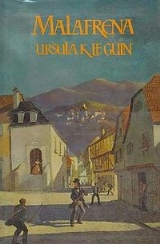
Malafrena
Encyclopedia
Malafrena is a 1979 novel by Ursula K. Le Guin
. Although she is best known for science fiction
and fantasy
, the only unusual element of this novel is that it takes place in the imaginary Central Europe
an country of Orsinia, which is also the setting of her collection Orsinian Tales
.
In many ways, Malafrena reads like a nineteenth-century novel
, with its many detailed characters, its political-movement and love-story subplots, its lack of the supernatural, and its settings that range from the mansions of the aristocracy to slums and a prison.
Malafrena is written for an adult audience, as opposed to children and young adults, the target audience of most of Le Guin's works in the 1979-1994 time frame.
. The hero is Itale Sorde, the son of the owner of an estate on a lake called Malafrena in a valley of the same name. Itale leaves the estate, against his father's will, to engage in nationalistic and revolutionary politics in the capital.
Luisa: A female character.
.
Ursula K. Le Guin
Ursula Kroeber Le Guin is an American author. She has written novels, poetry, children's books, essays, and short stories, notably in fantasy and science fiction...
. Although she is best known for science fiction
Science fiction
Science fiction is a genre of fiction dealing with imaginary but more or less plausible content such as future settings, futuristic science and technology, space travel, aliens, and paranormal abilities...
and fantasy
Fantasy
Fantasy is a genre of fiction that commonly uses magic and other supernatural phenomena as a primary element of plot, theme, or setting. Many works within the genre take place in imaginary worlds where magic is common...
, the only unusual element of this novel is that it takes place in the imaginary Central Europe
Central Europe
Central Europe or alternatively Middle Europe is a region of the European continent lying between the variously defined areas of Eastern and Western Europe...
an country of Orsinia, which is also the setting of her collection Orsinian Tales
Orsinian Tales
Orsinian Tales is a collection of eleven short stories by American writer Ursula K. Le Guin, set in the imaginary country of Orsinia.-Themes:...
.
In many ways, Malafrena reads like a nineteenth-century novel
19th century in literature
See also: 19th century in poetry, 18th century in literature, other events of the 19th century, 20th century in literature, list of years in literature....
, with its many detailed characters, its political-movement and love-story subplots, its lack of the supernatural, and its settings that range from the mansions of the aristocracy to slums and a prison.
Malafrena is written for an adult audience, as opposed to children and young adults, the target audience of most of Le Guin's works in the 1979-1994 time frame.
Plot summary
The story takes place from 1825 to 1830, when Orsinia is ruled by the Austrian EmpireAustrian Empire
The Austrian Empire was a modern era successor empire, which was centered on what is today's Austria and which officially lasted from 1804 to 1867. It was followed by the Empire of Austria-Hungary, whose proclamation was a diplomatic move that elevated Hungary's status within the Austrian Empire...
. The hero is Itale Sorde, the son of the owner of an estate on a lake called Malafrena in a valley of the same name. Itale leaves the estate, against his father's will, to engage in nationalistic and revolutionary politics in the capital.
Key characters
Itale Sorde: The protagonist of the story.Luisa: A female character.
Literary significance and criticism
Mike Cadden notes that Malafrena has not received as much critical attention as many of Le Guin's other works, primarily because the characters in the story do not connect well with one another. An imperceptible, omniscient author is used to tell the story, and Le Guin herself acknowledges one of the strongest influences on her Orsinian works is Russian literatureRussian literature
Russian literature refers to the literature of Russia or its émigrés, and to the Russian-language literature of several independent nations once a part of what was historically Russia or the Soviet Union...
.
Translations
- RussianRussian languageRussian is a Slavic language used primarily in Russia, Belarus, Uzbekistan, Kazakhstan, Tajikistan and Kyrgyzstan. It is an unofficial but widely spoken language in Ukraine, Moldova, Latvia, Turkmenistan and Estonia and, to a lesser extent, the other countries that were once constituent republics...
: "", Eksmo, 2004 - PolishPolish languagePolish is a language of the Lechitic subgroup of West Slavic languages, used throughout Poland and by Polish minorities in other countries...
: "", Wydawnictwo "Książnica", 2007

